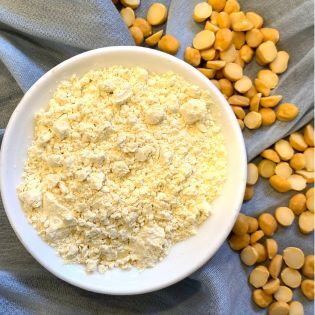BESAN (GRAM FLOUR)

In the vast realm of culinary delights and health foods, besan, commonly known as gram flour or chickpea flour, shines bright. A staple in many Indian kitchens, not only is it great for cooking, but it's also loaded with health benefits. Derived from ground chana dal, a type of chickpea, besan has been an integral part of Indian cuisine for centuries. Besan, or gram flour, offers remarkable health benefits. Its nutrient-rich profile, gluten-free nature, heart-healthy properties, blood sugar management potential, and skincare benefits make it a valuable addition to your daily routine.
Nutritional Content Of Besan (100g)
- Calories - 387kcal
- Fibre - 10.8g
- Carbohydrates - 57.8g
- Fat - 6.69g
- Proteins - 22.4g
Rich In Protein
- Besan is an excellent source of plant-based protein. It has significantly higher protein as compared to other flours like Wheat. Protein helps support muscle growth and energy. Besan is a plant-based protein source, making it ideal for vegetarians and vegans. It can help promote muscle growth and repair, support a healthy metabolism, and aid in weight management.
Gluten Free
- Gram flour, also called besan, garbanzo flour, or chickpea flour, is made from ground chickpeas, which are naturally gluten-free. Besan is naturally gluten- free, making it a suitable option for individuals with gluten intolerance or celiac disease. It can be used as a substitute for wheat flour in various recipes, allowing those with gluten sensitivities to enjoy a wide range of dishes.
Weight Management
- With its high protein and fiber content, besan can help promote satiety and control appetite. Including besan in your diet can assist in weight management by reducing calorie intake and preventing overeating. Besan is good for weight loss. The high fibre content, low glycemic index and presence of resistant starches that digest slowly may help you manage and lose weight.
Controls Blood Sugar
- Besan has a low glycemic index, meaning it causes a slower and steadier rise in blood sugar levels compared to refined wheat flour. This property can be beneficial for individuals with diabetes or those aiming to maintain stable blood sugar levels. Besan contains a high amount of resistant starch, and these starches are digested slowly, causing a reduced rise in blood glucose levels. The low glycemic index (tendency to cause a lower spike in blood glucose) of besan is an important factor that may help prevent and reduce the severity of type 2 diabetes
Improves Digestive Health
- The dietary fiber present in besan promotes healthy digestion and prevents constipation. It supports a healthy gut microbiome and can help alleviate digestive issues like bloating and indigestion. Consumption of besan is associated with increased dietary fibre intake. High dietary fibre intake is associated with improved bowel movement, increased frequency, and ease of defecation. Therefore, adding besan to your diet may help to facilitate a good bowel movement. To conclude, Besan offers remarkable benefits for both skin and hair care. As a natural exfoliator and cleanser, it gently removes dead skin cells, excess oil, and impurities, leaving your skin fresh and revitalized. You can create homemade face packs or scrubs by combining besan with ingredients like yoghurt, honey, or turmeric, which can improve skin texture, reduce acne, and promote a youthful glow.


